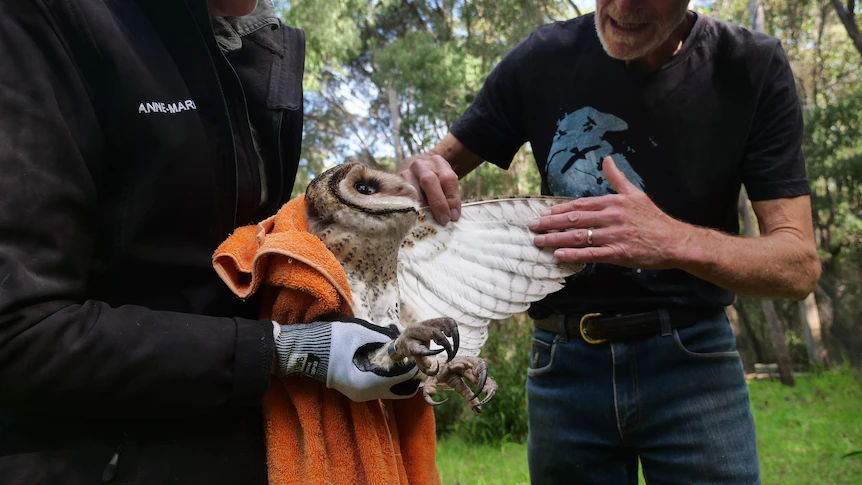By Caitlyn Davey
Copyright abc

When Anita Lussetti’s parents were dying, the family was supported by volunteers at Mercy Palliative Care.
The IT worker, then in her 40s, took six months off from her job to care for her parents, and was considering a career change at the same time.
“I decided that I needed something that gave me more purpose,” she says.
She began volunteering with Uniting Care, visiting socially isolated people, and decided to enrol in a degree in counselling.
“The volunteering just assured me that I was on the right path doing the right things,” she says.
Anita now works as a trauma counsellor and hasn’t looked back.
“I’m in the best job of my life,” she says.
Why volunteer
In Australia, an estimated 5 million people volunteer for various reasons.
A survey of employers found that 85 per cent valued volunteering as work experience when hiring.
Volunteering Australia CEO Mark Pearce says it can help build connections and help get a foot in the door in industries you may be new to.
Rachel Hannam, a psychologist specialising in career counselling, says it can be a great way to get into a role, or get a better view of an industry or organisation.
“I’ve certainly sent clients to volunteering and they’ve found plenty of organisations which love having volunteers and it’s often been a stepping stone for them, either psychologically or materially because they’ve ended up with paid work,” she says.
“It’s what we call a realistic job preview. So you give yourself a preview of what it might be like to work in a particular industry or organisation,” Dr Hannam says.
Mr Pearce says it can be a beneficial stepping stone for a number of different industries.
“We’ve certainly seen it a lot in industries like health and aged care, things to do with environment and animal welfare and also with organisations and industries involved in things like disaster recovery preparedness and relief.
“People will often get involved with the SES, which does a remarkable job in communities, they love it, they build experience, they become conversant with the language of the organisation and the sector, and then they may well look to gain employment in that sector.”
Volunteering is not just free labour
While valuable for experience, it’s important to note that volunteering is not just free labour.
Volunteering Australia notes that the definition of volunteering is, “time willingly given for the common good and without financial gain.”
“This is a really important definition,” Mr Pearce says.
Volunteering is distinct from unpaid internships or work experience.
Mr Pearce says volunteering has positive impacts on community, and can include animal welfare, arts, heritage, business, unions, emergency services, health, religion, law and welfare.
“It’s time willingly given for the common good. And this speaks for things like, for example, causes and others.”
Dispersing the fantasy
Volunteering can also help you understand how suitable an organisation is for you and how aligned it is with your values.
Sometimes, it can remove a misconception about a job.
Dr Hannam says she’s had clients who volunteered at an animal rescue and chose not to pursue it.
“It could have been other people, or it could have been the work was really not what they thought — [for example] It was monotonous and boring.
Dr Hannam herself had a “fantasy” of working as a school teacher.
“I remember I wanted to be a primary school teacher, had a fantasy of it, idealised the idea of being this awesome school teacher and I actually became a teacher — and it was a shock to the system of how different in reality it was to my fantasy,” she says.
If volunteering doesn’t feel like an option
Volunteering may not be suitable for a number of reasons. If you’re time-poor, or the locations don’t work, or the type of job you want to move into simply doesn’t facilitate voluntary work.
Dr Hannam says there are still ways you can get a feel for an industry.
“Go talk to people,” she says, recommending people connect with industry insiders, get to know the ins and outs, the frustrations of the job and read job descriptions.
Social media can be a helpful way to do this.
Mr Pearce makes the point that volunteering doesn’t have to be a large time commitment.
“As the name suggests, it’s voluntary. We’re seeing that, because people are far more time-poor, community expectations have changed quite a bit. People are becoming more willing to say: ‘I only have 2 hours in a week or maybe 1 hour every fortnight, but I really want to contribute.'”
And if you do sign up to a volunteering position and feel it’s not for you, there’s no obligation to continue.
“There’s no employment contract. So as a consequence of that, people can volunteer as and when it suits them,” says Mr Pearce.
And whether it’s the right fit or not, no decision is “wrong”, says Dr Hannam.



